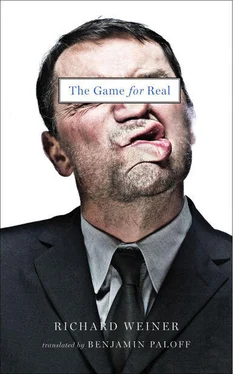Before a mirror stands a young girl; she has slight little hands, which please her. Her hands slide down from her bosom to her belly; it doesn’t mean anything, and Boulevard Poissonnière doesn’t ask about it: it’s used to it. — Before a mirror stands a fine-looking man, he’s tugging at the too-short sleeves of his heartbreaking Alba suit (heartbreaking, for it breaks the young ladies’ hearts), he squints at his own Toulousian profile, which is his better side; he tightens his slipped tie. Boulevard Poissonnière doesn’t ask what it means, for it’s used to it; for that matter, it has long since known what it means: the tyrants of Boulevard Poissonnière hang around in front of display mirrors like this every time, by some unfortunate accident — which for that matter they don’t whine about: c’est la vie —they’ve thrown themselves at one of those fifth of the girls they’ve accosted who is, with a nod to statistics, immune to them.
And right away there’s this one here, whom we’ve had our eyes on for a while now, having our eyes on our hero, who noticed him where the boulevard meets Rue d’Hauteville. And how not to notice an idler hovering with that oh-so-familiar sham busyness, from which he makes a show of not seeing so as to assume the equally affected look of a wretch struck by lightning out of the blue a moment later, that is, when (if) the doe he’s set his sights on reemerges, because he hasn’t just set his sights on another he wants to get, because if a young man from the Boulevard Poissonnière says “she’s the one,” love becomes a matter of prestige, and the one that has popped into the shop over there. . But this haberdashery on Rue d’Hauteville, it seems, has told her that the back room is still occupied. It so happened that the lightning’s command, already rescinded, could be given after all, and just as the doe, walking in the direction of the Porte Saint-Denis, lashed the cunning huntsman with that look, after which, as they say, a prudent man loses his taste for it forever. But the dark-haired man was barely twenty-three; in other words, he was of a generation for whom the verb “to despair” is a synonym for the verb “to dishonor oneself.” To them, everything is an encouragement: even the look “no, you’re not worth it,” which begins at the shoes — according to which everything else is unerringly surmised — and ends at the eyes, at which she hurls an apodictic “out of the question” that leaves no room for doubt.
Before phenomena by no means entirely unambiguous, the youths from the Boulevard Poissonnière are also likely to say “you never know.” But their “you never know” is not so much dubitative as an affirmation of life, and the truism “dames are fickle” is, on the Boulevard Poissonnière, a mathematical postulate. It excludes the possibility that a woman would make firm decisions according to a principle, whatever it might be; it establishes that they only ever decide on a case-by-case basis, not suspecting that it is therefore assigning them a pragmatic posture; on the contrary, it holds that the most distinctive mark of feminine thinking is capriciousness; the Boulevard Poissonnière is an optimistic skeptic.
The idler, brushed off by the doe’s look, has admitted to the universe and to the boulevard — and admitted without bitterness or embarrassment — that he has lost so far. He’s slipped his finger under his collar, tilted his head to the side, and turned on his heels: such is the conventional speech of the Boulevard Poissonnière for expressing one’s having been rebuffed, a defeat that is never sealed; it’s a mere outpost skirmish, and the main detachment can christen itself with the name “outpost” as well, an opportunistic stratagem, to be sure: optimism’s unconquerable bulwark. — So the idler turned on his heels: 360 degrees; behind them is the firm confession, through them the return to the point of departure: physically and morally: see the rebuffed man who’s traced 360 degrees around his own axis! No longer is he rebuffed, he’s just unattainable, he’s once again a fine-looking man through and through, whom just a fifth of the girls and boys he accosts— statistics, please! — can resist.
See him before the mirror, and how he’s raised his head! See him, how he admires his own image with such natural assurance, and say whether you can come up with a failure for him, a ruination that could hold a candle to this confidence! — He is so immersed in affectionate and deferential self-regard that the dense flow of passers-by has as if spat him out and forsaken him as punishment for his having betrayed the community of the street. He’s been left alone, but then what is solitude to someone whose plethoricity is such that he is a community unto himself? The street has cast him out? He’s brushed it off. He and his image have fallen in love with each other with so unfussy an ardor that it was actually the two of them, irresistible, invincible, who had been in control; he was in control. She there, the one who’d rebuffed him? There is no she; there is only the fact that the number of those who aren’t worth the trouble has increased by one. One of that fifth for whom he’s not their “type.” But anyway, there are also people who don’t like oysters. All the worse for them; he pities them, a somewhat contemptuous pity. For him, the problem of one-hundred-percent-ness is not a problem of the attainable and the denied; it’s a question of eccentric idiosyncrasy.
New arc lamps were now flaring again in his eyes — three thousand degrees of heat. They’ve already forgotten the marginal happenstance that had extinguished them a moment before, they’ve honestly forgotten. He’s raised his head so high, as if looking out for that impossible yoke under which he would have been bent, his fingers with their still-boyish knuckles — these fingers adapted to dry, unwieldy, painful, and sweetly punitive embraces — unbuttoned his overcoat, tugged a bit at his vest, buttoned it up again, gave his tie and the downturned brim of his hat an imperious flick, and with a snap these fingers said “good luck!” to him who was the only person he counted on absolutely: himself.
And now it’s the snoop who is walking past the mirror; the snoop has cast a fleeting sidelong glance. . Whom does he see? An elderly child. And this disastrous kitchen boy of moral petitions says: “That one there looks after himself; when we look after ourselves we become self-confident. Look after yourself!”
He recalled the mirrors at Benedictine Mill, the mirrors in town. Did they lie? They did not. They spoke the truth: but it was the truth of betrayal, for he betrays himself. That’s how it is, he betrays himself! He’s not quite thirty-five. So is the truth that he’s ugly truer than the truth that he’s not repulsive? And in particular, what’s truer than the truth that he also has a right, a right I say, to this here ? — Thirty-five, and how does he dress? Why does he dress like a man rebuffed? If he were to put some effort into it — like that other fellow. If he were to command himself to! The mimetic method of exercising one’s faith: a proven mystical practice. –
The baggy knees, and the unironed coat, and the stupid habit of cramming his pockets with so many unnecessary things. And why skimp on underwear? Like you can’t tell? Idiot! Neglect always begins where it can’t be seen! And this disgraceful fakery with the threadbare end of his necktie. . So who was the rascal who whispered to him that all of this is of no consequence ? As though he didn’t know his name: his so-called soul . — Of no consequence! — And he, who had obeyed him! Who’d repudiated himself for a sanctimonious stranger who thinks of nothing but how to leave him run-down, dilapidated, wrecked, in a lurch — his own foolishly accommodating shelter! His soul! The place where it’s set its sights, this soul, his soul, what if he gets there too, he who knows this place , who is languishing and suffering? He won’t, you say? So then who’s it for? — But he’s pointing at his soul. — It’s a secure box, isn’t it? The spurned substance besides which there is no him ! It’s enough to whisper sweet nothings to it: “Be on guard, don’t work for free”—and then we’ll see what the soul can do. . What it can do against two.
Читать дальше












